MCAST University: Soft Skills within Hospitality Assignment Report
VerifiedAdded on 2022/09/09
|10
|1947
|17
Report
AI Summary
This report provides a comprehensive analysis of soft skills essential for success in the hospitality industry. It addresses key areas such as identifying leadership blind spots, the role of emotions and self-control in guest interactions, the importance of self-confidence, and the application of the Johari Window for effective communication within teams. The report also examines the impact of stress on hospitality businesses, offering management strategies for improvement, and emphasizes the significance of time management. Furthermore, it incorporates Gibb's Reflective Cycle to analyze a personal experience, providing insights into learning and professional development. The report draws on various academic sources to support its findings and recommendations.
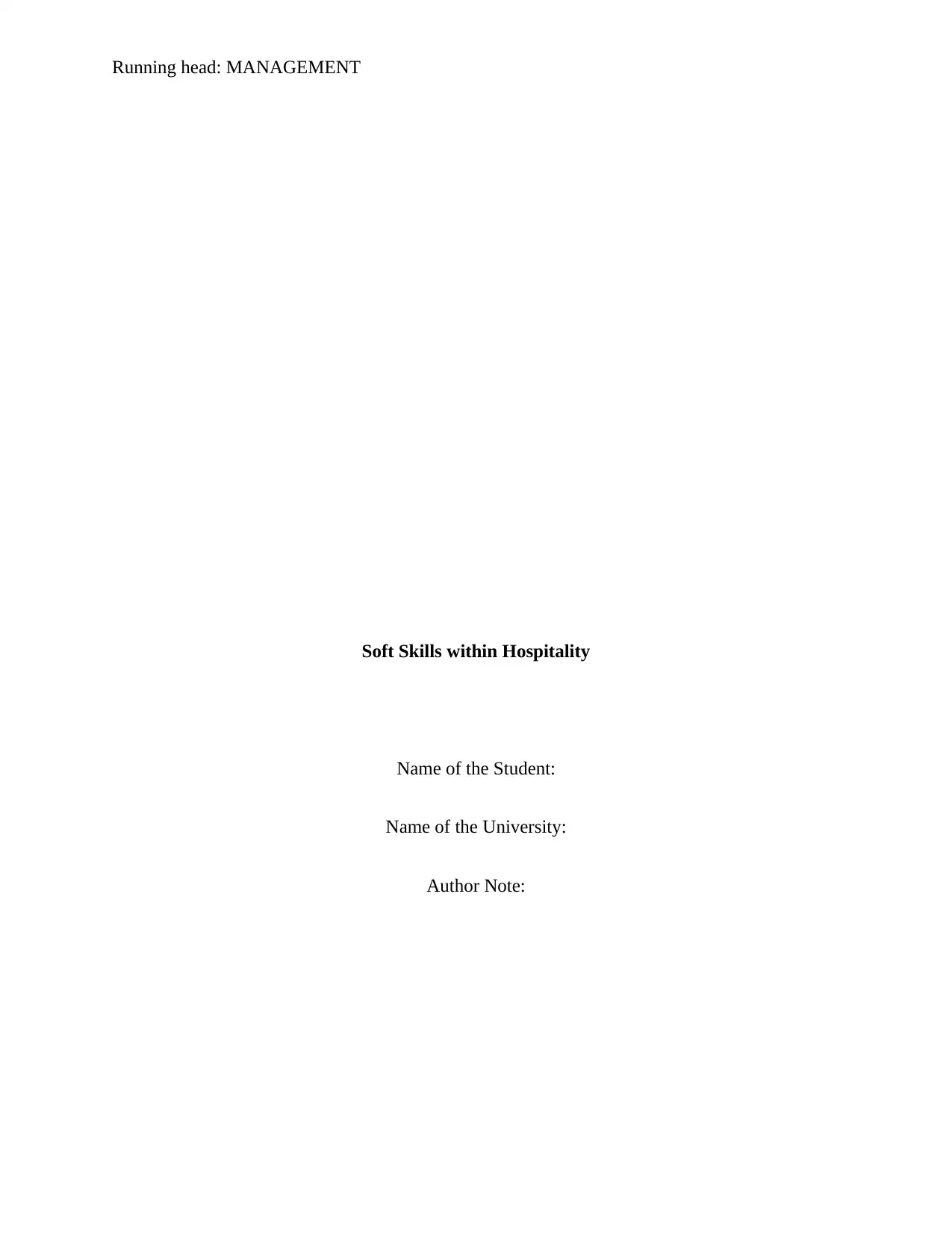
Running head: MANAGEMENT
Soft Skills within Hospitality
Name of the Student:
Name of the University:
Author Note:
Soft Skills within Hospitality
Name of the Student:
Name of the University:
Author Note:
Paraphrase This Document
Need a fresh take? Get an instant paraphrase of this document with our AI Paraphraser
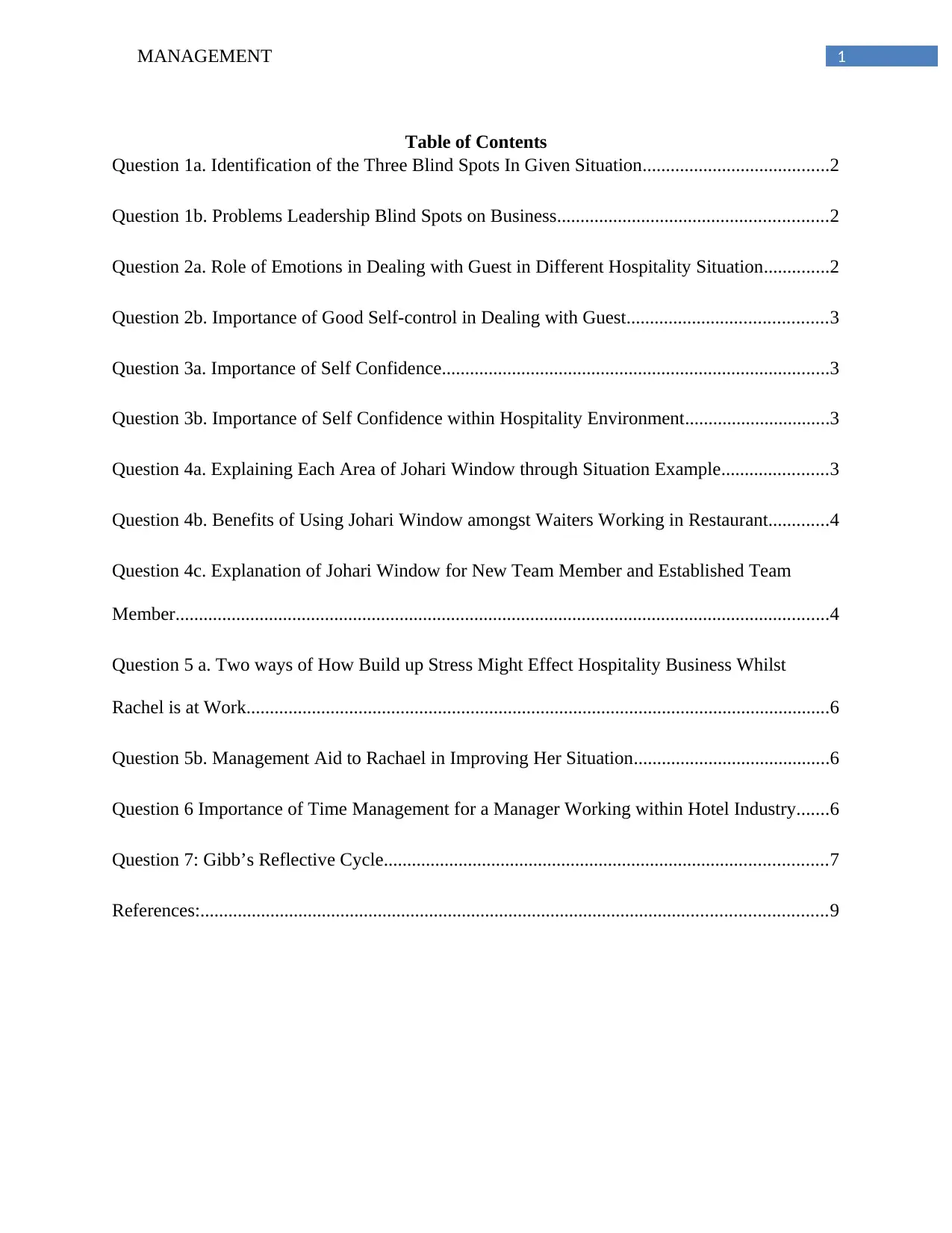
1MANAGEMENT
Table of Contents
Question 1a. Identification of the Three Blind Spots In Given Situation........................................2
Question 1b. Problems Leadership Blind Spots on Business..........................................................2
Question 2a. Role of Emotions in Dealing with Guest in Different Hospitality Situation..............2
Question 2b. Importance of Good Self-control in Dealing with Guest...........................................3
Question 3a. Importance of Self Confidence...................................................................................3
Question 3b. Importance of Self Confidence within Hospitality Environment...............................3
Question 4a. Explaining Each Area of Johari Window through Situation Example.......................3
Question 4b. Benefits of Using Johari Window amongst Waiters Working in Restaurant.............4
Question 4c. Explanation of Johari Window for New Team Member and Established Team
Member............................................................................................................................................4
Question 5 a. Two ways of How Build up Stress Might Effect Hospitality Business Whilst
Rachel is at Work.............................................................................................................................6
Question 5b. Management Aid to Rachael in Improving Her Situation..........................................6
Question 6 Importance of Time Management for a Manager Working within Hotel Industry.......6
Question 7: Gibb’s Reflective Cycle...............................................................................................7
References:......................................................................................................................................9
Table of Contents
Question 1a. Identification of the Three Blind Spots In Given Situation........................................2
Question 1b. Problems Leadership Blind Spots on Business..........................................................2
Question 2a. Role of Emotions in Dealing with Guest in Different Hospitality Situation..............2
Question 2b. Importance of Good Self-control in Dealing with Guest...........................................3
Question 3a. Importance of Self Confidence...................................................................................3
Question 3b. Importance of Self Confidence within Hospitality Environment...............................3
Question 4a. Explaining Each Area of Johari Window through Situation Example.......................3
Question 4b. Benefits of Using Johari Window amongst Waiters Working in Restaurant.............4
Question 4c. Explanation of Johari Window for New Team Member and Established Team
Member............................................................................................................................................4
Question 5 a. Two ways of How Build up Stress Might Effect Hospitality Business Whilst
Rachel is at Work.............................................................................................................................6
Question 5b. Management Aid to Rachael in Improving Her Situation..........................................6
Question 6 Importance of Time Management for a Manager Working within Hotel Industry.......6
Question 7: Gibb’s Reflective Cycle...............................................................................................7
References:......................................................................................................................................9
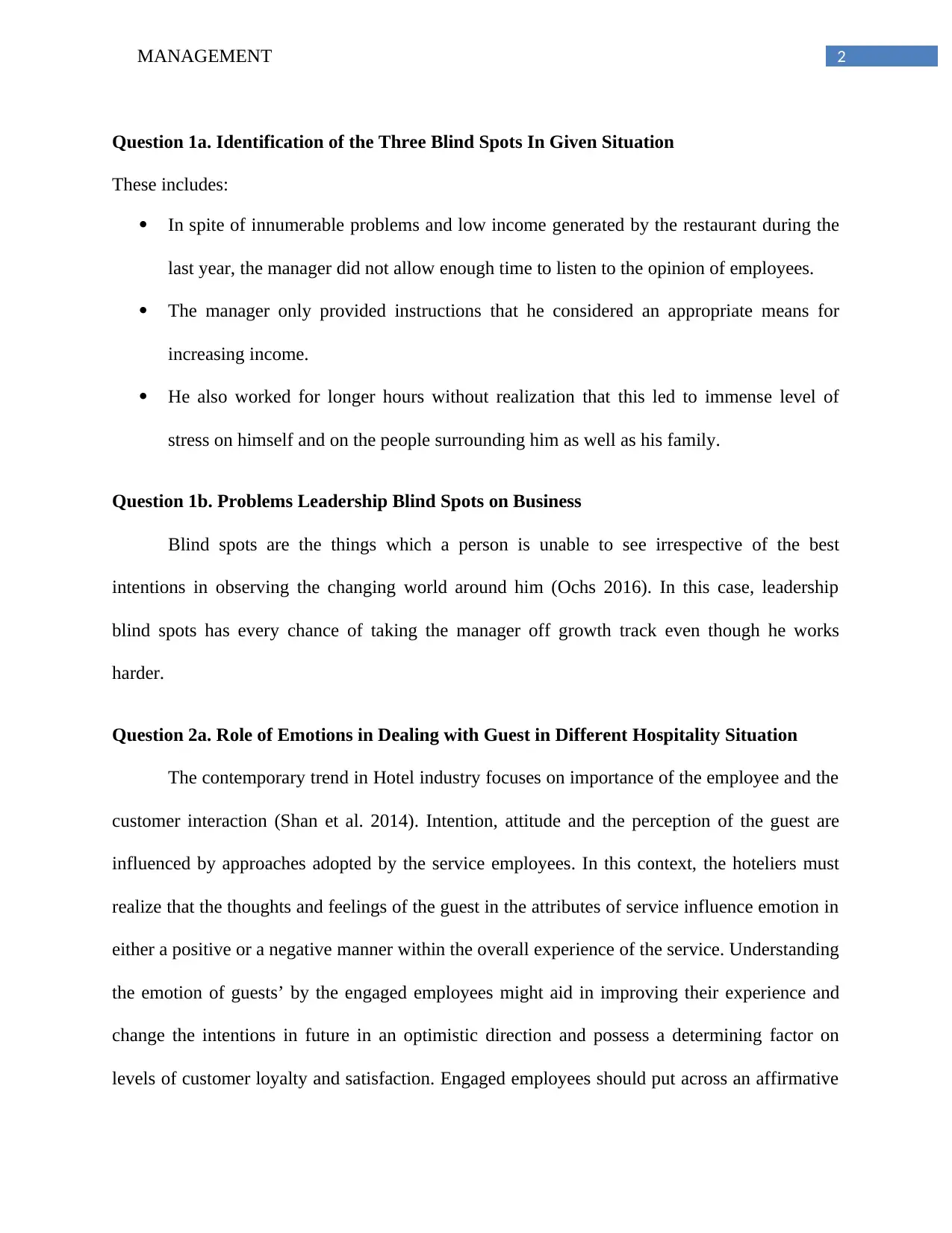
2MANAGEMENT
Question 1a. Identification of the Three Blind Spots In Given Situation
These includes:
In spite of innumerable problems and low income generated by the restaurant during the
last year, the manager did not allow enough time to listen to the opinion of employees.
The manager only provided instructions that he considered an appropriate means for
increasing income.
He also worked for longer hours without realization that this led to immense level of
stress on himself and on the people surrounding him as well as his family.
Question 1b. Problems Leadership Blind Spots on Business
Blind spots are the things which a person is unable to see irrespective of the best
intentions in observing the changing world around him (Ochs 2016). In this case, leadership
blind spots has every chance of taking the manager off growth track even though he works
harder.
Question 2a. Role of Emotions in Dealing with Guest in Different Hospitality Situation
The contemporary trend in Hotel industry focuses on importance of the employee and the
customer interaction (Shan et al. 2014). Intention, attitude and the perception of the guest are
influenced by approaches adopted by the service employees. In this context, the hoteliers must
realize that the thoughts and feelings of the guest in the attributes of service influence emotion in
either a positive or a negative manner within the overall experience of the service. Understanding
the emotion of guests’ by the engaged employees might aid in improving their experience and
change the intentions in future in an optimistic direction and possess a determining factor on
levels of customer loyalty and satisfaction. Engaged employees should put across an affirmative
Question 1a. Identification of the Three Blind Spots In Given Situation
These includes:
In spite of innumerable problems and low income generated by the restaurant during the
last year, the manager did not allow enough time to listen to the opinion of employees.
The manager only provided instructions that he considered an appropriate means for
increasing income.
He also worked for longer hours without realization that this led to immense level of
stress on himself and on the people surrounding him as well as his family.
Question 1b. Problems Leadership Blind Spots on Business
Blind spots are the things which a person is unable to see irrespective of the best
intentions in observing the changing world around him (Ochs 2016). In this case, leadership
blind spots has every chance of taking the manager off growth track even though he works
harder.
Question 2a. Role of Emotions in Dealing with Guest in Different Hospitality Situation
The contemporary trend in Hotel industry focuses on importance of the employee and the
customer interaction (Shan et al. 2014). Intention, attitude and the perception of the guest are
influenced by approaches adopted by the service employees. In this context, the hoteliers must
realize that the thoughts and feelings of the guest in the attributes of service influence emotion in
either a positive or a negative manner within the overall experience of the service. Understanding
the emotion of guests’ by the engaged employees might aid in improving their experience and
change the intentions in future in an optimistic direction and possess a determining factor on
levels of customer loyalty and satisfaction. Engaged employees should put across an affirmative
⊘ This is a preview!⊘
Do you want full access?
Subscribe today to unlock all pages.

Trusted by 1+ million students worldwide
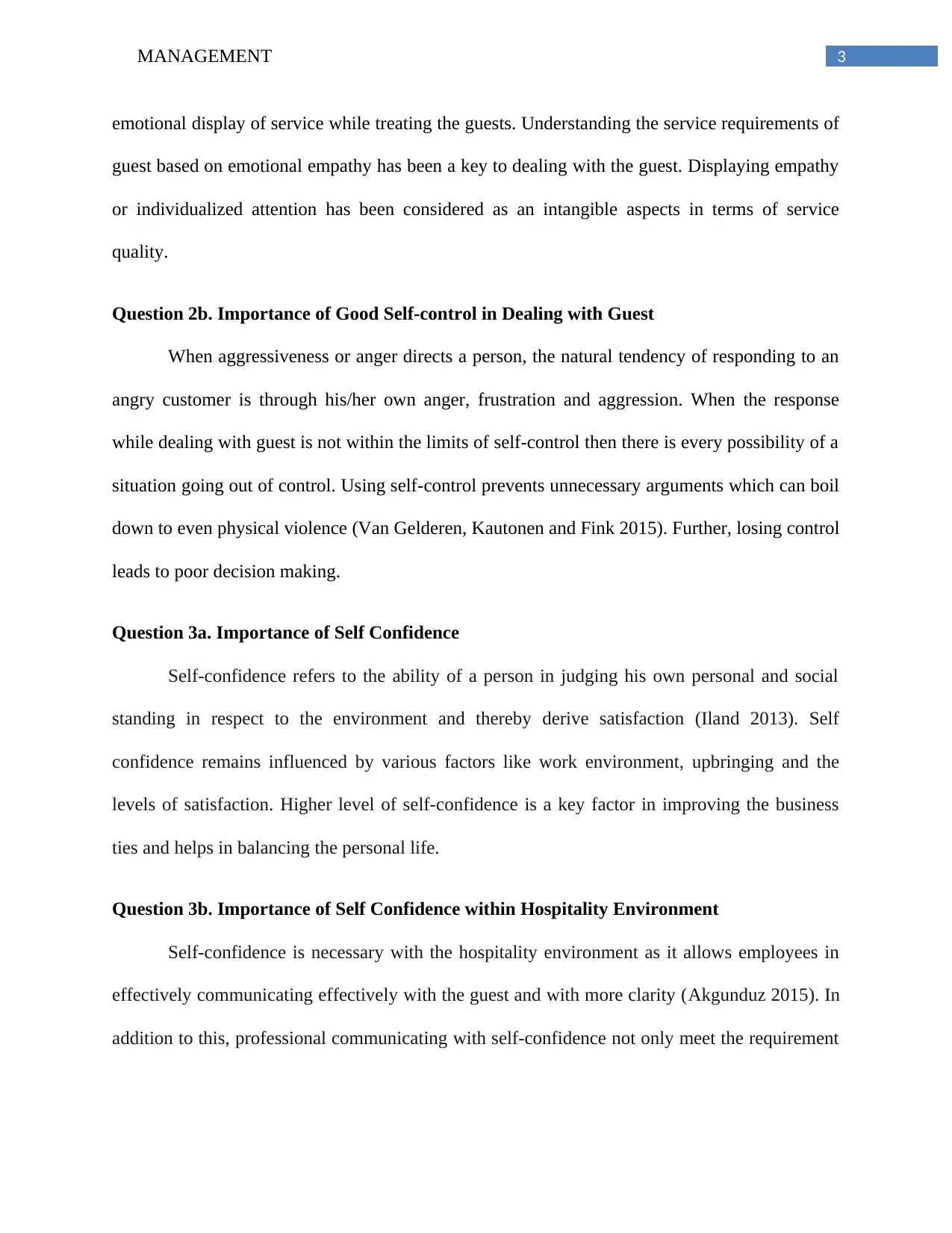
3MANAGEMENT
emotional display of service while treating the guests. Understanding the service requirements of
guest based on emotional empathy has been a key to dealing with the guest. Displaying empathy
or individualized attention has been considered as an intangible aspects in terms of service
quality.
Question 2b. Importance of Good Self-control in Dealing with Guest
When aggressiveness or anger directs a person, the natural tendency of responding to an
angry customer is through his/her own anger, frustration and aggression. When the response
while dealing with guest is not within the limits of self-control then there is every possibility of a
situation going out of control. Using self-control prevents unnecessary arguments which can boil
down to even physical violence (Van Gelderen, Kautonen and Fink 2015). Further, losing control
leads to poor decision making.
Question 3a. Importance of Self Confidence
Self-confidence refers to the ability of a person in judging his own personal and social
standing in respect to the environment and thereby derive satisfaction (Iland 2013). Self
confidence remains influenced by various factors like work environment, upbringing and the
levels of satisfaction. Higher level of self-confidence is a key factor in improving the business
ties and helps in balancing the personal life.
Question 3b. Importance of Self Confidence within Hospitality Environment
Self-confidence is necessary with the hospitality environment as it allows employees in
effectively communicating effectively with the guest and with more clarity (Akgunduz 2015). In
addition to this, professional communicating with self-confidence not only meet the requirement
emotional display of service while treating the guests. Understanding the service requirements of
guest based on emotional empathy has been a key to dealing with the guest. Displaying empathy
or individualized attention has been considered as an intangible aspects in terms of service
quality.
Question 2b. Importance of Good Self-control in Dealing with Guest
When aggressiveness or anger directs a person, the natural tendency of responding to an
angry customer is through his/her own anger, frustration and aggression. When the response
while dealing with guest is not within the limits of self-control then there is every possibility of a
situation going out of control. Using self-control prevents unnecessary arguments which can boil
down to even physical violence (Van Gelderen, Kautonen and Fink 2015). Further, losing control
leads to poor decision making.
Question 3a. Importance of Self Confidence
Self-confidence refers to the ability of a person in judging his own personal and social
standing in respect to the environment and thereby derive satisfaction (Iland 2013). Self
confidence remains influenced by various factors like work environment, upbringing and the
levels of satisfaction. Higher level of self-confidence is a key factor in improving the business
ties and helps in balancing the personal life.
Question 3b. Importance of Self Confidence within Hospitality Environment
Self-confidence is necessary with the hospitality environment as it allows employees in
effectively communicating effectively with the guest and with more clarity (Akgunduz 2015). In
addition to this, professional communicating with self-confidence not only meet the requirement
Paraphrase This Document
Need a fresh take? Get an instant paraphrase of this document with our AI Paraphraser
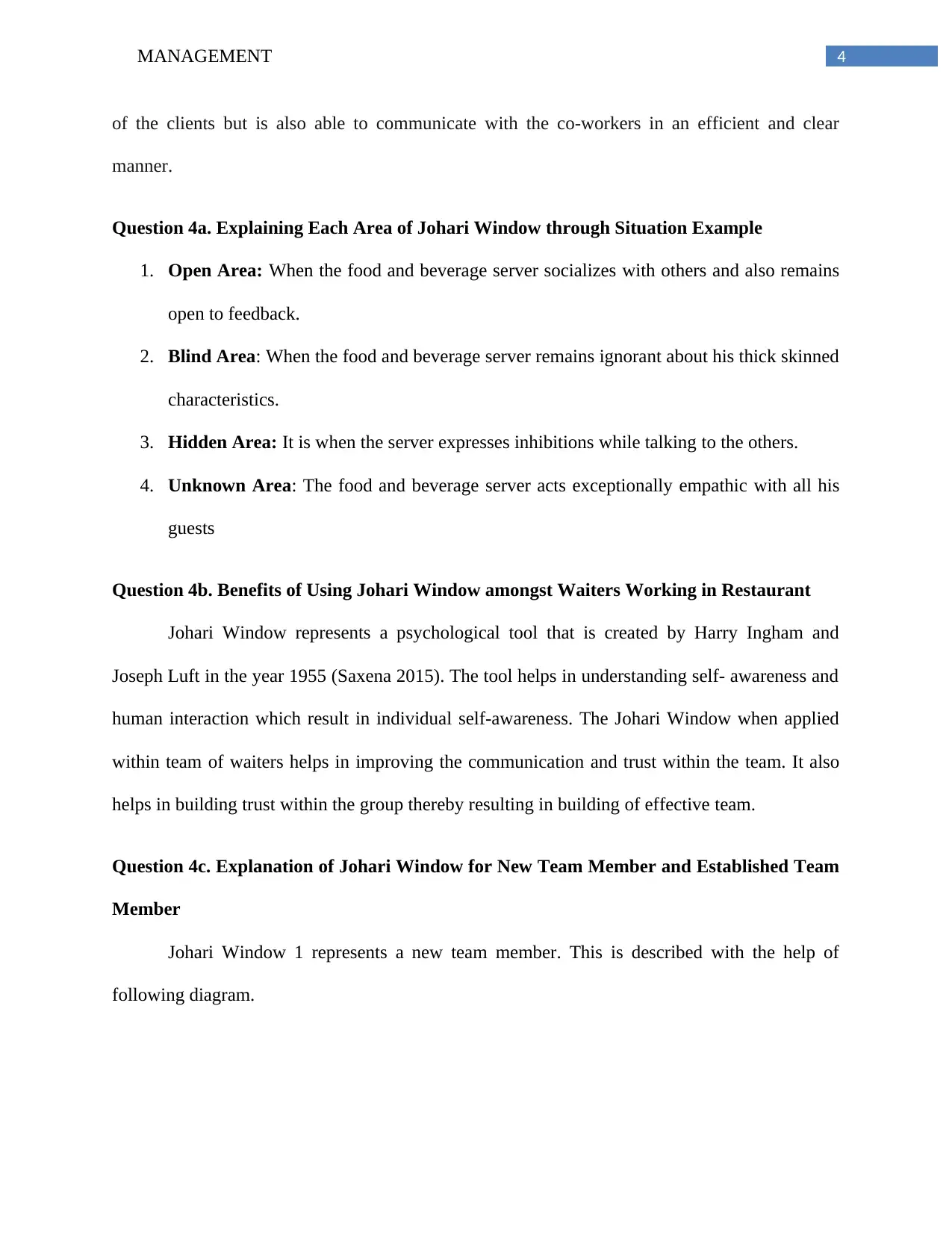
4MANAGEMENT
of the clients but is also able to communicate with the co-workers in an efficient and clear
manner.
Question 4a. Explaining Each Area of Johari Window through Situation Example
1. Open Area: When the food and beverage server socializes with others and also remains
open to feedback.
2. Blind Area: When the food and beverage server remains ignorant about his thick skinned
characteristics.
3. Hidden Area: It is when the server expresses inhibitions while talking to the others.
4. Unknown Area: The food and beverage server acts exceptionally empathic with all his
guests
Question 4b. Benefits of Using Johari Window amongst Waiters Working in Restaurant
Johari Window represents a psychological tool that is created by Harry Ingham and
Joseph Luft in the year 1955 (Saxena 2015). The tool helps in understanding self- awareness and
human interaction which result in individual self-awareness. The Johari Window when applied
within team of waiters helps in improving the communication and trust within the team. It also
helps in building trust within the group thereby resulting in building of effective team.
Question 4c. Explanation of Johari Window for New Team Member and Established Team
Member
Johari Window 1 represents a new team member. This is described with the help of
following diagram.
of the clients but is also able to communicate with the co-workers in an efficient and clear
manner.
Question 4a. Explaining Each Area of Johari Window through Situation Example
1. Open Area: When the food and beverage server socializes with others and also remains
open to feedback.
2. Blind Area: When the food and beverage server remains ignorant about his thick skinned
characteristics.
3. Hidden Area: It is when the server expresses inhibitions while talking to the others.
4. Unknown Area: The food and beverage server acts exceptionally empathic with all his
guests
Question 4b. Benefits of Using Johari Window amongst Waiters Working in Restaurant
Johari Window represents a psychological tool that is created by Harry Ingham and
Joseph Luft in the year 1955 (Saxena 2015). The tool helps in understanding self- awareness and
human interaction which result in individual self-awareness. The Johari Window when applied
within team of waiters helps in improving the communication and trust within the team. It also
helps in building trust within the group thereby resulting in building of effective team.
Question 4c. Explanation of Johari Window for New Team Member and Established Team
Member
Johari Window 1 represents a new team member. This is described with the help of
following diagram.
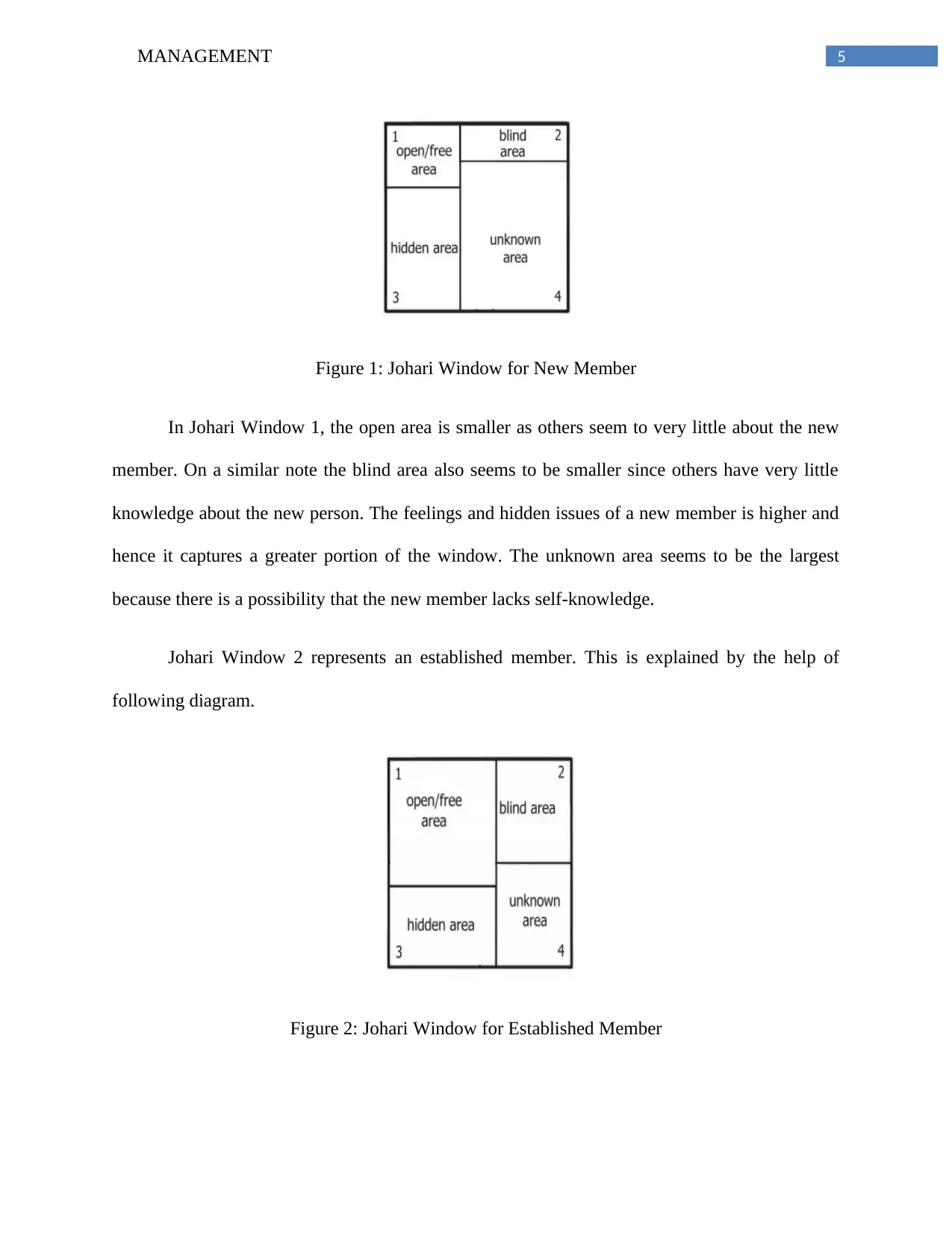
5MANAGEMENT
Figure 1: Johari Window for New Member
In Johari Window 1, the open area is smaller as others seem to very little about the new
member. On a similar note the blind area also seems to be smaller since others have very little
knowledge about the new person. The feelings and hidden issues of a new member is higher and
hence it captures a greater portion of the window. The unknown area seems to be the largest
because there is a possibility that the new member lacks self-knowledge.
Johari Window 2 represents an established member. This is explained by the help of
following diagram.
Figure 2: Johari Window for Established Member
Figure 1: Johari Window for New Member
In Johari Window 1, the open area is smaller as others seem to very little about the new
member. On a similar note the blind area also seems to be smaller since others have very little
knowledge about the new person. The feelings and hidden issues of a new member is higher and
hence it captures a greater portion of the window. The unknown area seems to be the largest
because there is a possibility that the new member lacks self-knowledge.
Johari Window 2 represents an established member. This is explained by the help of
following diagram.
Figure 2: Johari Window for Established Member
⊘ This is a preview!⊘
Do you want full access?
Subscribe today to unlock all pages.

Trusted by 1+ million students worldwide
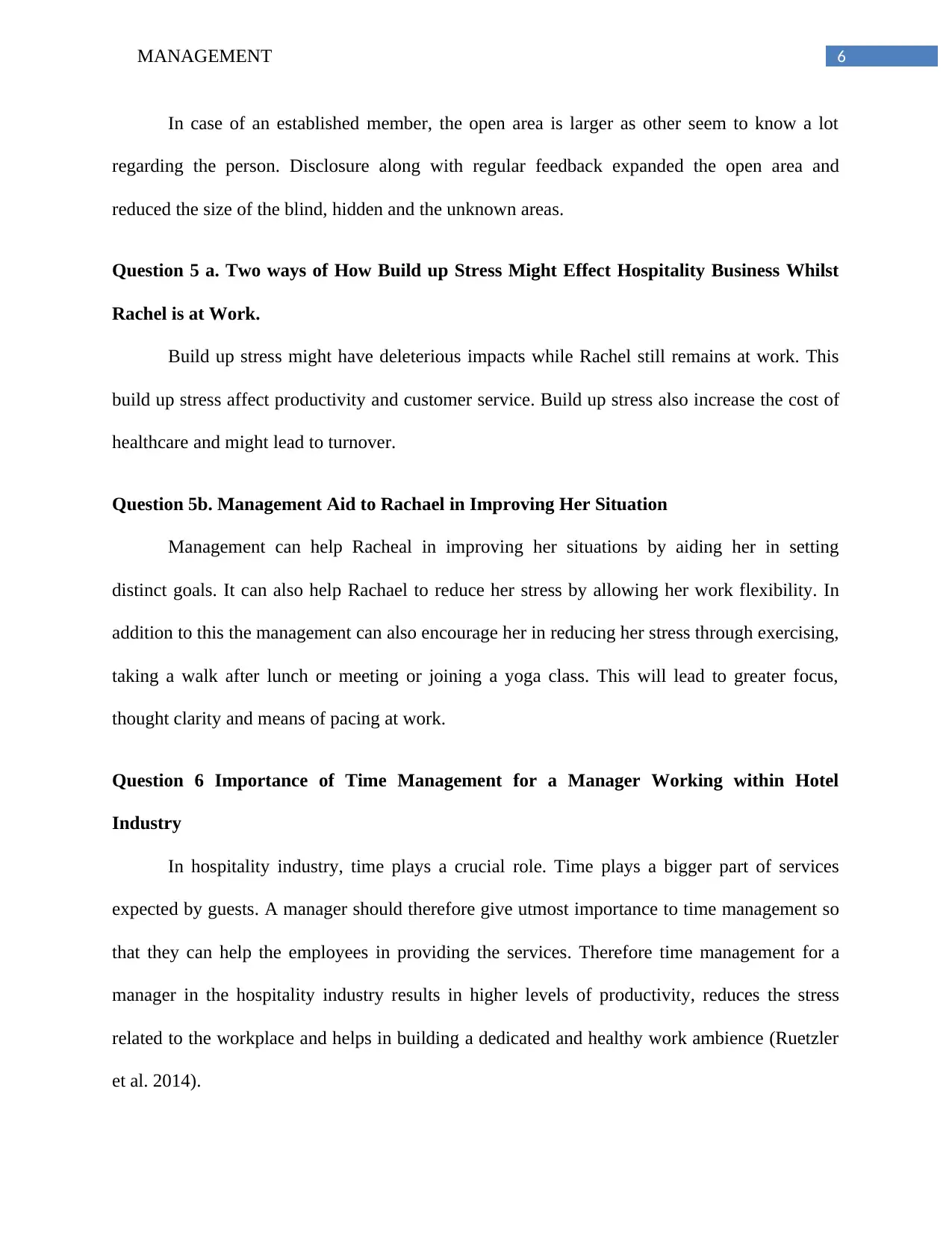
6MANAGEMENT
In case of an established member, the open area is larger as other seem to know a lot
regarding the person. Disclosure along with regular feedback expanded the open area and
reduced the size of the blind, hidden and the unknown areas.
Question 5 a. Two ways of How Build up Stress Might Effect Hospitality Business Whilst
Rachel is at Work.
Build up stress might have deleterious impacts while Rachel still remains at work. This
build up stress affect productivity and customer service. Build up stress also increase the cost of
healthcare and might lead to turnover.
Question 5b. Management Aid to Rachael in Improving Her Situation
Management can help Racheal in improving her situations by aiding her in setting
distinct goals. It can also help Rachael to reduce her stress by allowing her work flexibility. In
addition to this the management can also encourage her in reducing her stress through exercising,
taking a walk after lunch or meeting or joining a yoga class. This will lead to greater focus,
thought clarity and means of pacing at work.
Question 6 Importance of Time Management for a Manager Working within Hotel
Industry
In hospitality industry, time plays a crucial role. Time plays a bigger part of services
expected by guests. A manager should therefore give utmost importance to time management so
that they can help the employees in providing the services. Therefore time management for a
manager in the hospitality industry results in higher levels of productivity, reduces the stress
related to the workplace and helps in building a dedicated and healthy work ambience (Ruetzler
et al. 2014).
In case of an established member, the open area is larger as other seem to know a lot
regarding the person. Disclosure along with regular feedback expanded the open area and
reduced the size of the blind, hidden and the unknown areas.
Question 5 a. Two ways of How Build up Stress Might Effect Hospitality Business Whilst
Rachel is at Work.
Build up stress might have deleterious impacts while Rachel still remains at work. This
build up stress affect productivity and customer service. Build up stress also increase the cost of
healthcare and might lead to turnover.
Question 5b. Management Aid to Rachael in Improving Her Situation
Management can help Racheal in improving her situations by aiding her in setting
distinct goals. It can also help Rachael to reduce her stress by allowing her work flexibility. In
addition to this the management can also encourage her in reducing her stress through exercising,
taking a walk after lunch or meeting or joining a yoga class. This will lead to greater focus,
thought clarity and means of pacing at work.
Question 6 Importance of Time Management for a Manager Working within Hotel
Industry
In hospitality industry, time plays a crucial role. Time plays a bigger part of services
expected by guests. A manager should therefore give utmost importance to time management so
that they can help the employees in providing the services. Therefore time management for a
manager in the hospitality industry results in higher levels of productivity, reduces the stress
related to the workplace and helps in building a dedicated and healthy work ambience (Ruetzler
et al. 2014).
Paraphrase This Document
Need a fresh take? Get an instant paraphrase of this document with our AI Paraphraser
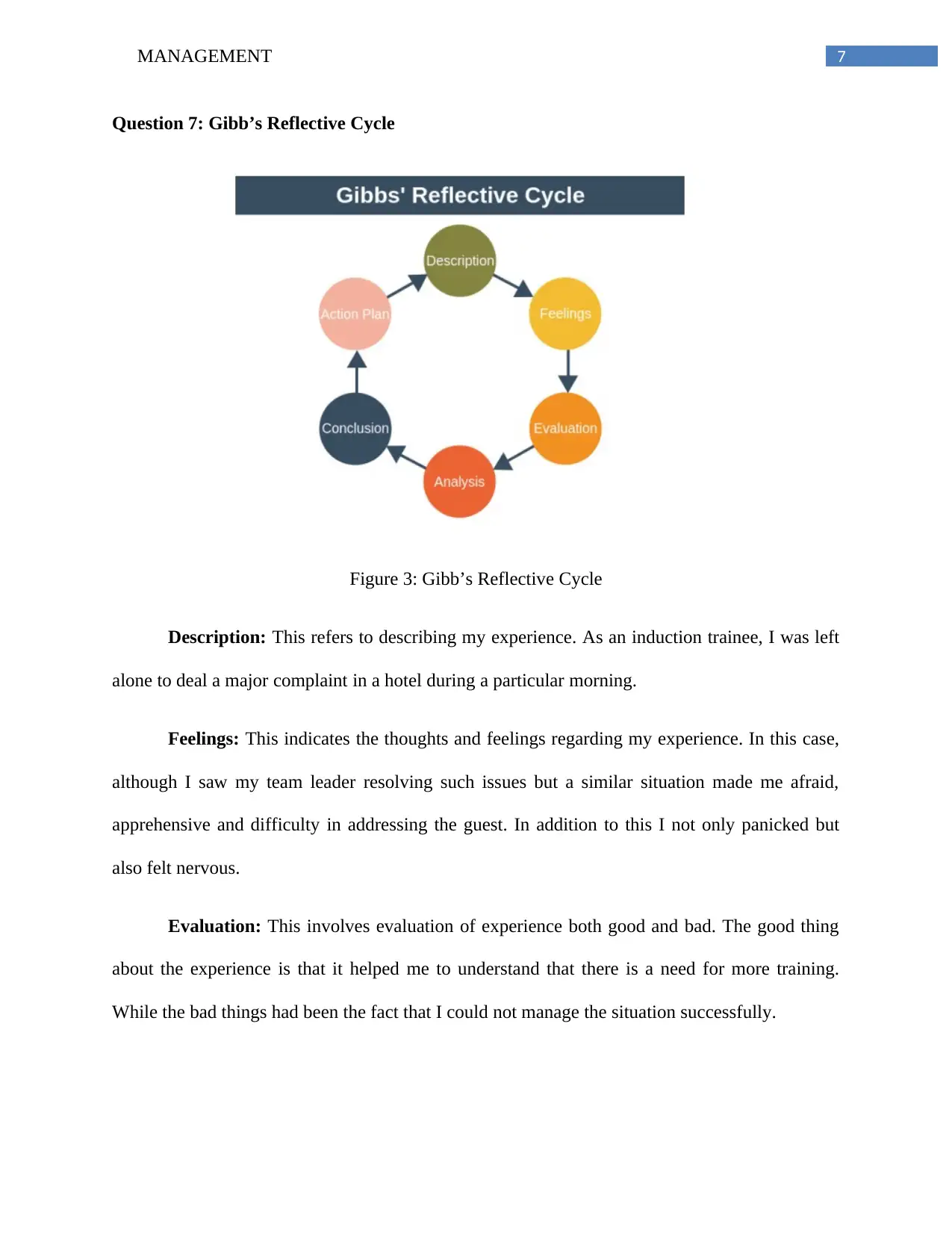
7MANAGEMENT
Question 7: Gibb’s Reflective Cycle
Figure 3: Gibb’s Reflective Cycle
Description: This refers to describing my experience. As an induction trainee, I was left
alone to deal a major complaint in a hotel during a particular morning.
Feelings: This indicates the thoughts and feelings regarding my experience. In this case,
although I saw my team leader resolving such issues but a similar situation made me afraid,
apprehensive and difficulty in addressing the guest. In addition to this I not only panicked but
also felt nervous.
Evaluation: This involves evaluation of experience both good and bad. The good thing
about the experience is that it helped me to understand that there is a need for more training.
While the bad things had been the fact that I could not manage the situation successfully.
Question 7: Gibb’s Reflective Cycle
Figure 3: Gibb’s Reflective Cycle
Description: This refers to describing my experience. As an induction trainee, I was left
alone to deal a major complaint in a hotel during a particular morning.
Feelings: This indicates the thoughts and feelings regarding my experience. In this case,
although I saw my team leader resolving such issues but a similar situation made me afraid,
apprehensive and difficulty in addressing the guest. In addition to this I not only panicked but
also felt nervous.
Evaluation: This involves evaluation of experience both good and bad. The good thing
about the experience is that it helped me to understand that there is a need for more training.
While the bad things had been the fact that I could not manage the situation successfully.
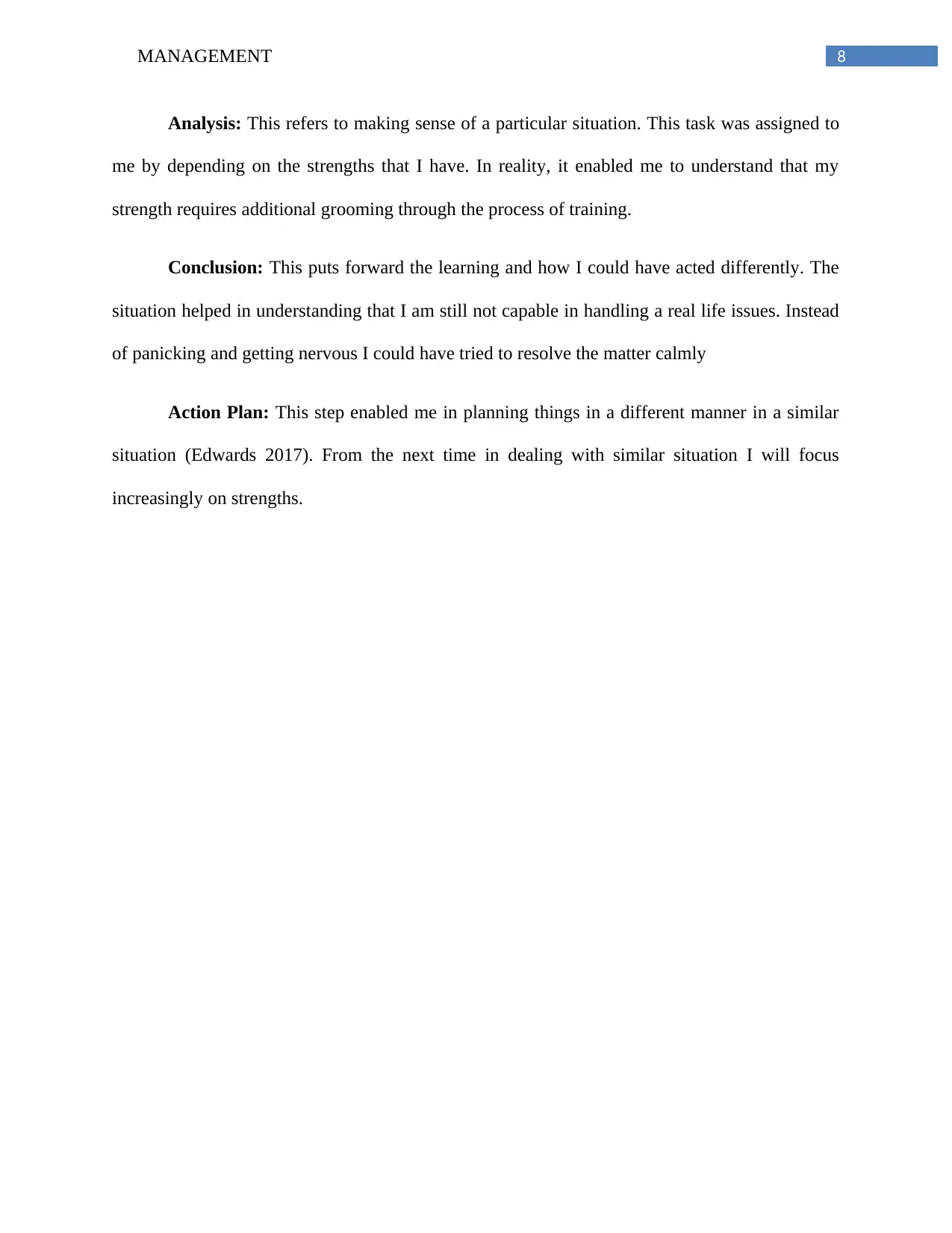
8MANAGEMENT
Analysis: This refers to making sense of a particular situation. This task was assigned to
me by depending on the strengths that I have. In reality, it enabled me to understand that my
strength requires additional grooming through the process of training.
Conclusion: This puts forward the learning and how I could have acted differently. The
situation helped in understanding that I am still not capable in handling a real life issues. Instead
of panicking and getting nervous I could have tried to resolve the matter calmly
Action Plan: This step enabled me in planning things in a different manner in a similar
situation (Edwards 2017). From the next time in dealing with similar situation I will focus
increasingly on strengths.
Analysis: This refers to making sense of a particular situation. This task was assigned to
me by depending on the strengths that I have. In reality, it enabled me to understand that my
strength requires additional grooming through the process of training.
Conclusion: This puts forward the learning and how I could have acted differently. The
situation helped in understanding that I am still not capable in handling a real life issues. Instead
of panicking and getting nervous I could have tried to resolve the matter calmly
Action Plan: This step enabled me in planning things in a different manner in a similar
situation (Edwards 2017). From the next time in dealing with similar situation I will focus
increasingly on strengths.
⊘ This is a preview!⊘
Do you want full access?
Subscribe today to unlock all pages.

Trusted by 1+ million students worldwide
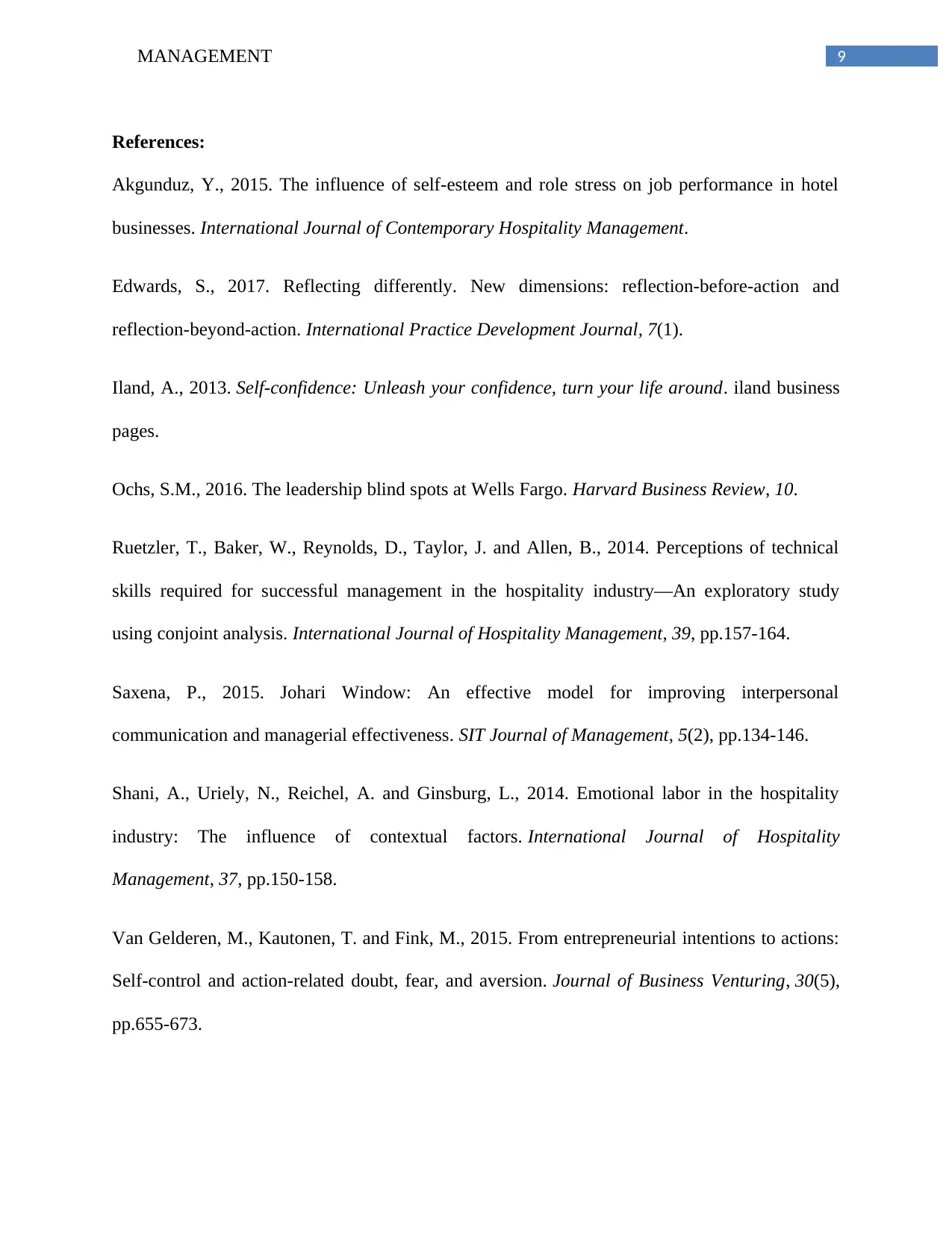
9MANAGEMENT
References:
Akgunduz, Y., 2015. The influence of self-esteem and role stress on job performance in hotel
businesses. International Journal of Contemporary Hospitality Management.
Edwards, S., 2017. Reflecting differently. New dimensions: reflection-before-action and
reflection-beyond-action. International Practice Development Journal, 7(1).
Iland, A., 2013. Self-confidence: Unleash your confidence, turn your life around. iland business
pages.
Ochs, S.M., 2016. The leadership blind spots at Wells Fargo. Harvard Business Review, 10.
Ruetzler, T., Baker, W., Reynolds, D., Taylor, J. and Allen, B., 2014. Perceptions of technical
skills required for successful management in the hospitality industry—An exploratory study
using conjoint analysis. International Journal of Hospitality Management, 39, pp.157-164.
Saxena, P., 2015. Johari Window: An effective model for improving interpersonal
communication and managerial effectiveness. SIT Journal of Management, 5(2), pp.134-146.
Shani, A., Uriely, N., Reichel, A. and Ginsburg, L., 2014. Emotional labor in the hospitality
industry: The influence of contextual factors. International Journal of Hospitality
Management, 37, pp.150-158.
Van Gelderen, M., Kautonen, T. and Fink, M., 2015. From entrepreneurial intentions to actions:
Self-control and action-related doubt, fear, and aversion. Journal of Business Venturing, 30(5),
pp.655-673.
References:
Akgunduz, Y., 2015. The influence of self-esteem and role stress on job performance in hotel
businesses. International Journal of Contemporary Hospitality Management.
Edwards, S., 2017. Reflecting differently. New dimensions: reflection-before-action and
reflection-beyond-action. International Practice Development Journal, 7(1).
Iland, A., 2013. Self-confidence: Unleash your confidence, turn your life around. iland business
pages.
Ochs, S.M., 2016. The leadership blind spots at Wells Fargo. Harvard Business Review, 10.
Ruetzler, T., Baker, W., Reynolds, D., Taylor, J. and Allen, B., 2014. Perceptions of technical
skills required for successful management in the hospitality industry—An exploratory study
using conjoint analysis. International Journal of Hospitality Management, 39, pp.157-164.
Saxena, P., 2015. Johari Window: An effective model for improving interpersonal
communication and managerial effectiveness. SIT Journal of Management, 5(2), pp.134-146.
Shani, A., Uriely, N., Reichel, A. and Ginsburg, L., 2014. Emotional labor in the hospitality
industry: The influence of contextual factors. International Journal of Hospitality
Management, 37, pp.150-158.
Van Gelderen, M., Kautonen, T. and Fink, M., 2015. From entrepreneurial intentions to actions:
Self-control and action-related doubt, fear, and aversion. Journal of Business Venturing, 30(5),
pp.655-673.
1 out of 10
Related Documents
Your All-in-One AI-Powered Toolkit for Academic Success.
+13062052269
info@desklib.com
Available 24*7 on WhatsApp / Email
![[object Object]](/_next/static/media/star-bottom.7253800d.svg)
Unlock your academic potential
Copyright © 2020–2026 A2Z Services. All Rights Reserved. Developed and managed by ZUCOL.



